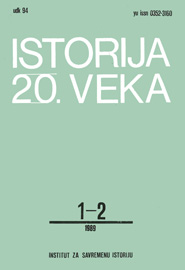„RUSKI ARHIV“ I FAŠIZAM
THE „RUSSIAN ARCHIVE” AND FASCISM
Author(s): Miroslav JovanovićSubject(s): Media studies, Political history, Recent History (1900 till today), Interwar Period (1920 - 1939), Fascism, Nazism and WW II
Published by: Institut za savremenu istoriju, Beograd
Keywords: Kingdom of Yugoslavia; periodicals; emigration; "Russian archive"; fascism;
Summary/Abstract: The Russian emigrant's colony in the Kingdom of Yugoslavia published over 150 newspapers and periodicals. Among the most significant was the „Russian Archive”. Its importance was due, first, to being one of the few periodicals of the Russian emigration to be published in the Serbo-Croat language and, second, to the time in which it was being published. The example and existence of the „Russian Archive” demonstrate that the question of the position of the Russian emigrants’ colony in the Kingdom of Yugoslavia and in Europe between the Wars, regarding fascism, is more complex than was supposed until now. We have before us a periodical with a decided anti-fascist orientation, published in the turbulent, critical years of European and Yugoslav politics and history, the period between 1928 and 1937. Headed by the left-oriented intellectuals from the ranks of the SR, who were living in Yugoslavia, Vladimir Lebedov, Fiodor Mallin, Aleksije Jelačić, and under the patronage of the reputable Yugoslav diplomat, Stanoje Pelivanović, the „Russian Archive” gathered some of the most prominent Russian emigrants into the ranks of its permanent associates, Evgenije Zamjatin, Marina Cvetajeva, Aleksej Remizov, Marko Slonin. The personal beliefs of its associates and the editorial concept of the „Russian Archive” practically obliged it to express its position regarding the appearance of Russian fascism and fascism in general. The subject matter of the articles about fascism was determined by the fact that Russia was at the center of their attention. Hence, the editors confined themselves only to the subject of Germany and Japan, the immediate threats in a possible future conflict with the USSR, and the appearance of fascism in the ranks of the Russian emigration, while Italy is hardly mentioned. The „Russian Archive” was at first moderate in manifesting a clear and definite anti-fascist position but its views kept growing more severe with time. In can only be a matter of speculation whether such an orientation was one of the reasons for the termination of the periodical’s publishing. It would have been interesting to follow the development of such assessments and views had the „Russian Archive” continued to be published.
Journal: Istorija 20. veka
- Issue Year: 1989
- Issue No: 1+2
- Page Range: 169-197
- Page Count: 29
- Language: Serbian

